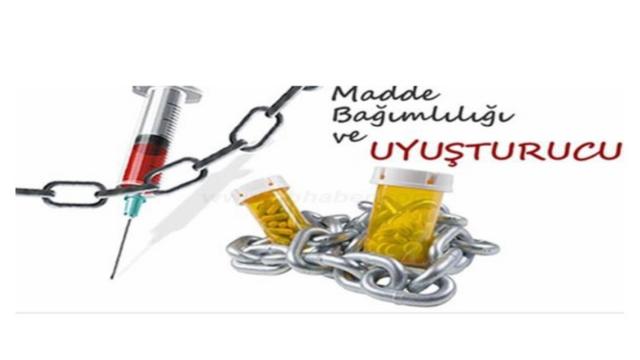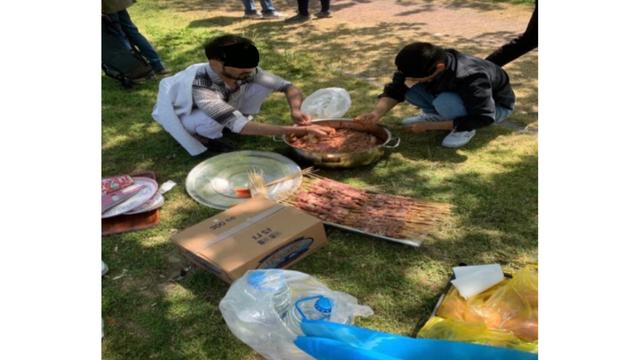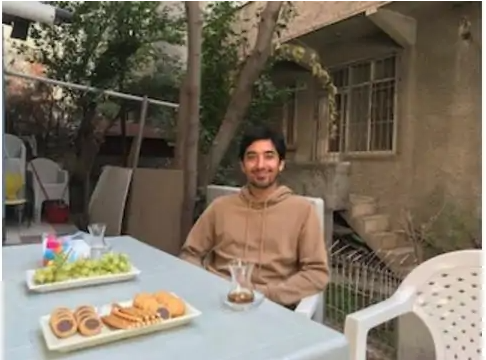A flickering island of hope pieces together the fallout of Beijing’s “War on Terror.” It needs help.
by Ruth Ingram
Bitter Winter, 10/26/2022
There are activists who shout slogans, march, and carry banners, there are those who write and lobby governments, and there are yet others who behind the scenes are left to silently pick up the collateral carnage of war.
One such young man lives in Istanbul. The vast city straddling Asia and Europe is home to more than 50,000 Uyghur exiles, most of whom have been wrenched from their roots, torn from familiarity, and severed from everything and everyone they hold dear.
Burdened for youth like him, who came to study but were cut loose from family and financial support when the roundups, disappearances, and worst excesses of Beijing’s purge of the Turkic minorities started in earnest in the homeland in 2016, Abdusemi Hoten opened a hostel for homeless and troubled Uyghurs two years ago as a branch of the East Turkistan New Generation Movement Association.

Here those who had fallen into homelessness, crime, violence, and drug dependance could take refuge and start to rebuild their lives. Those who had lost parents to the re-education camps, torture, and abuse could find another “family” to which they could belong, a warm bed on which to lay their heads and three square meals a day. Here they would find a listening ear when the trauma of losing everything became too much to bear alone.
Two years have passed since the empty four-story shell in a suburb of the metropolis was donated by a well-wisher and with much fanfare from Uyghur groups, internationally and locally, the project was kick-started with a few initial donations. But with a mounting economic crisis in Turkey, galloping inflation, and donor fatigue within the Uyghur community, the very existence of this hostel and the vulnerable individuals it was set up to serve, seems to have been forgotten and the urgency of the cause lost in the mists of other pressing needs. Funds have now dried up and the hostel is at breaking point.

But drug addicts and traumatized youth don’t just disappear. Their needs are as intense as they were the project first saw the light of day.
Abdusemi spoke to Bitter Winter from the echoey shell of their building in the midst of a redecorating spree courtesy of a recent rare donation. The arrival of much needed psychological help in the form of an enthusiastic psychology graduate has doubled his team to two, and the new arrival was wielding a paint brush and broom as a new resident was trying on his recently acquired secondhand football boots in anticipation of a match later that day. Twenty-two hungry residents to be fed three times a day, bills to be paid, the house to be kept warm as winter approaches, and a variety of activities to help steer the young men from their dangerous trajectory, have all emptied the pot to the lowest it has ever been.

Embarrassing forays to the rich, cap in hand have often been rebuffed, some even suggesting the youths were not worth saving and Abdusemi was wasting his time. Uyghur charities in Istanbul themselves are overwhelmed with the needs of orphans, widows, the sick, and those with a host of emotionally driven conditions brought on by tragic tales from the homeland, accounts of relatives’ camp ordeals, and social media silence from their wives, husbands, children, and parents left behind.
Abdusemi, a Masters student in Istanbul, juggles life between his own studies and organizing tailor made programs for each resident. He runs group work sessions, gym visits, picnics, and football matches and provides a six-month intensive drug rehabilitation program and weekly personal one to one psychological support for those who are alone and far from their families. He arranges visiting speakers with inspirational stories of their own to encourage the young men.
Family therapy is also offered to restore broken relationships for those still in families. Taking the lead from residents themselves, some are offered apprenticeships, computer training or specific educational opportunities, and all are offered English classes.

Abdusemi’s dream is for not a single Uyghur homeless street child or drug addict to be left roaming the alleyways of Istanbul. Street fights have abated thanks to his intervention, already many have left their past behind and are on their way to becoming chefs, carpenters, and computer programmers, and some have embarked on further education.
But Abdusemi fears for the future. He pays himself a basic minimum wage from the kitty, but with an impending marriage and need to move into rented accommodation, he will need a raise. The newly appointed psychologist cannot live on air and the wind will not pay the bills. He believe passionately in what he is doing as a unique vocation, but also realizes that for plans to move forward he will need a team. Struggling hand to mouth is not the path to growth, and there are still youths on the street living in damp cellars, prey to traffickers and criminals searching for the vulnerable to do their bidding, whom he longs to help.

Sitting laconically across from our Bitter Winter reporter he explains that this job he loves is not for everyone. “It is my vocation,” he says. He would be hard to replace. He hopes against hope that they will find a way to keep going and carries on planning as if the bank was full. “I’m not asking for much,” he muses. “If there is anyone out there with money, these lives are worth saving.” In two short years, 45 have been through his center, ten addicts have turned their back on drugs, and others have moved on to lead independent lives.
“We could take more young people,” he said. “The future of our next generation is at stake. There is so much more we would like to do if we had the funds.”
More information can be obtained from Abdusemi himself via Ruth Ingram at info@bitterwinter.org.

